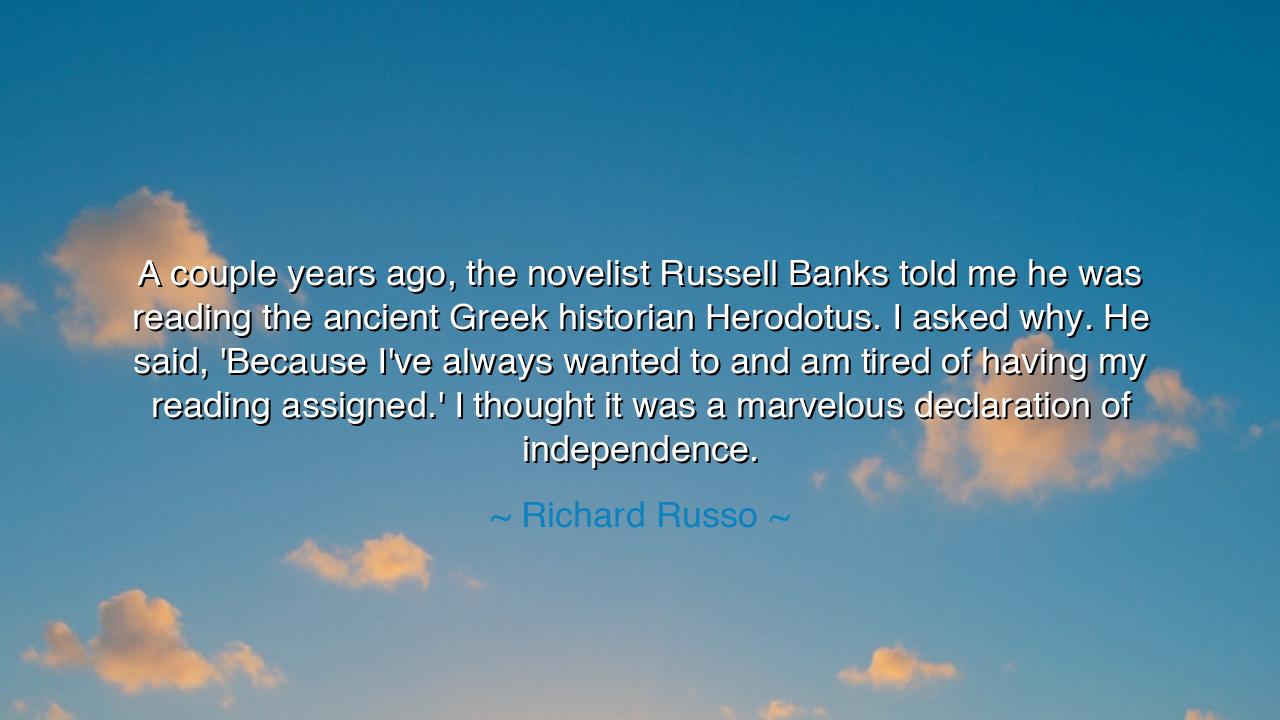
A couple years ago, the novelist Russell Banks told me he was
A couple years ago, the novelist Russell Banks told me he was reading the ancient Greek historian Herodotus. I asked why. He said, 'Because I've always wanted to and am tired of having my reading assigned.' I thought it was a marvelous declaration of independence.






The Freedom of the Mind
Hear the wisdom of Richard Russo, who once recalled the words of his friend, the novelist Russell Banks, and turned them into a parable for the soul:
“A couple years ago, the novelist Russell Banks told me he was reading the ancient Greek historian Herodotus. I asked why. He said, ‘Because I've always wanted to and am tired of having my reading assigned.’ I thought it was a marvelous declaration of independence.”
In these few lines lies a truth older than empires and as fresh as the dawn—that the truest independence is not of nation or wealth, but of the mind. When Banks chose to read Herodotus, not because it was required, but because his heart desired it, he performed an act of quiet rebellion against the forces that seek to dictate our curiosity. His gesture, simple yet profound, stands as a declaration of intellectual freedom, a reminder that the highest liberty is to think, to choose, and to seek knowledge by one’s own will.
The Meaning of Intellectual Freedom
To be “tired of having my reading assigned” is to awaken from the long sleep of obedience—to reject the invisible chains of expectation that bind not the body, but the imagination. For all our lives, others tell us what to study, what to admire, what to believe. We are shaped by schools, by systems, by the judgments of critics and the habits of peers. Yet somewhere within, the spirit yearns to choose for itself—to learn what calls to it, not what is commanded.
Thus, when Banks turned to Herodotus, he was not merely reading history; he was reclaiming sovereignty over his own mind. In that act, small as it seemed, he joined the ranks of all who have ever dared to question the prescribed path and seek truth on their own terms.
The Wisdom of Herodotus and the Spirit of Curiosity
It is fitting that his choice was Herodotus, the “Father of History,” whose own writings were born from wanderlust and wonder. Herodotus traveled across the ancient world not because he was told to, but because he was driven by curiosity. He listened to strangers, recorded their customs, and sought meaning in their stories. He lived as a pilgrim of knowledge, believing that wisdom was not the property of one people or one tradition, but of all humankind.
In choosing to read Herodotus freely, Banks mirrored the historian’s own spirit: the courage to seek knowledge beyond command, to let curiosity be the only guide. The gesture became symbolic—the modern artist learning from the ancient explorer that truth is never handed down; it must be discovered anew by those brave enough to seek it.
The Ancient Echo of Independence
Russo’s admiration—his calling this moment “a marvelous declaration of independence”—reveals a wisdom echoed by philosophers of every age. Socrates drank the hemlock rather than abandon his right to question; Galileo faced the wrath of his church rather than silence the evidence of his eyes. Each of them, in his own way, said to the world: I will not have my thinking assigned.
This is the independence that transforms mere learning into wisdom—the refusal to let others define what is worthy of thought. The one who learns by command is a servant of knowledge, but the one who learns by choice becomes its master.
The Real-Life Reflection
Consider the story of Albert Einstein, who as a child grew bored of his formal schooling and taught himself physics and philosophy from books he found on his own. His teachers dismissed him as lazy, yet it was that same independent curiosity that led him to see what others could not. When he later rewrote the laws of the universe, he was not performing an act of rebellion, but of freedom—the same freedom that Banks declared when he reached for a book by his own choosing.
In every age, progress belongs to the independent mind. It is the artist who paints what no patron requests, the scientist who questions the sacred rule, the child who reads beyond the syllabus—these are the souls who carry civilization forward.
The Lesson for the Modern Soul
From this moment between Russo and Banks, let us learn: freedom of thought is not a luxury—it is a duty. To be told what to read, what to think, and what to love may bring comfort, but it brings no growth. The mind, like the body, must exercise its will to remain alive.
So let each person, no matter their age, return to curiosity. Pick up the book you have “always wanted to read.” Follow the path of wonder without waiting for permission. In doing so, you affirm your independence of spirit—the birthright of every human being.
The Eternal Teaching
Thus, Richard Russo’s tale is more than an anecdote—it is a mirror held before every soul. To live freely, you must dare to think freely. To think freely, you must reclaim your time, your attention, your curiosity. The mind that waits to be told what to learn will forever serve others; the mind that follows its own wonder will serve truth itself.
So go forth as Herodotus once did—into the vast, unexplored worlds of knowledge. Read what you love. Seek what stirs your heart. For in every act of chosen learning, you declare your own revolution—the revolution of the free and sovereign mind. And that, truly, is the noblest declaration of independence of all.






AAdministratorAdministrator
Welcome, honored guests. Please leave a comment, we will respond soon